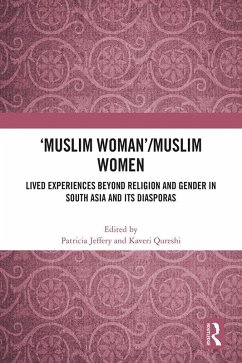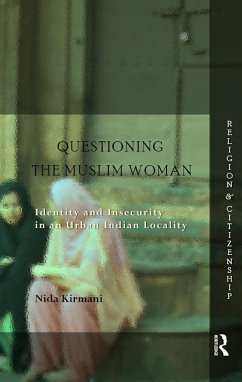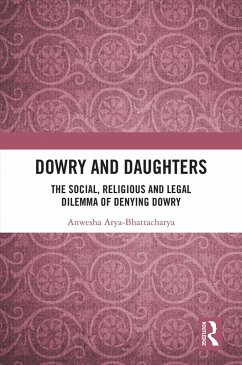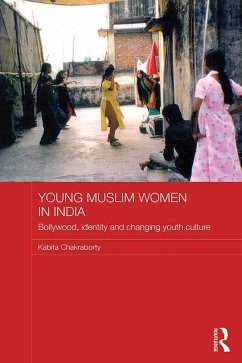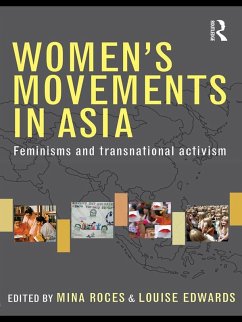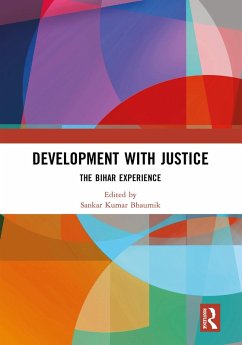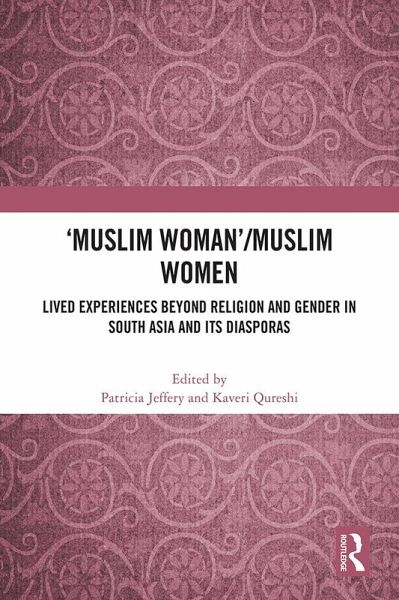
'Muslim Woman'/Muslim women (eBook, ePUB)
Lived Experiences beyond Religion and Gender in South Asia and Its Diasporas
Redaktion: Jeffery, Patricia; Qureshi, Kaveri
Versandkostenfrei!
Sofort per Download lieferbar
52,95 €
inkl. MwSt.
Weitere Ausgaben:

PAYBACK Punkte
26 °P sammeln!
This book addresses South Asian Muslim women's lived experiences, whilst questioning dominant concepts of agency.Negative, homogenising constructions of the 'Muslim Woman' are not the result of a knowledge deficit, but constitutive of Euro-American and Hindu nationalist forms of civilizational self-assurance. Portraying the richness and diversity of Muslim women's voices and agency cannot, therefore, rectify discourses casting Muslim women as invisible or silent, so long as the vision of agency is shackled to dominant feminist precepts. Mindful of this problem, the book examines Muslim women's...
This book addresses South Asian Muslim women's lived experiences, whilst questioning dominant concepts of agency.
Negative, homogenising constructions of the 'Muslim Woman' are not the result of a knowledge deficit, but constitutive of Euro-American and Hindu nationalist forms of civilizational self-assurance. Portraying the richness and diversity of Muslim women's voices and agency cannot, therefore, rectify discourses casting Muslim women as invisible or silent, so long as the vision of agency is shackled to dominant feminist precepts. Mindful of this problem, the book examines Muslim women's legal agency with respect to the family, their claims-making upon the state, livelihoods, and the impact of male outmigration on 'left-behind' wives. Working across these domains of everyday life, contributors highlight how women's vulnerabilities within their families dovetail with oppressions experienced in the local state, the labour market, and in the streets. Women's economic locations continue to shape their agency in crucial ways, with upward mobility often entailing greater restrictions on women's mobility and independence; yet the chapters caution against romanticising the ironic independence of poverty. Collectively, this volume showcases Muslim's women's diverse identities and desires that may be sidelined in dominant concepts of agency.
This book will be beneficial for scholars and students of South Asian Studies interested in gender justice, politics and the intersection of religion, culture, and identity. The chapters in this book were originally published as a special issue of Contemporary South Asia.
Negative, homogenising constructions of the 'Muslim Woman' are not the result of a knowledge deficit, but constitutive of Euro-American and Hindu nationalist forms of civilizational self-assurance. Portraying the richness and diversity of Muslim women's voices and agency cannot, therefore, rectify discourses casting Muslim women as invisible or silent, so long as the vision of agency is shackled to dominant feminist precepts. Mindful of this problem, the book examines Muslim women's legal agency with respect to the family, their claims-making upon the state, livelihoods, and the impact of male outmigration on 'left-behind' wives. Working across these domains of everyday life, contributors highlight how women's vulnerabilities within their families dovetail with oppressions experienced in the local state, the labour market, and in the streets. Women's economic locations continue to shape their agency in crucial ways, with upward mobility often entailing greater restrictions on women's mobility and independence; yet the chapters caution against romanticising the ironic independence of poverty. Collectively, this volume showcases Muslim's women's diverse identities and desires that may be sidelined in dominant concepts of agency.
This book will be beneficial for scholars and students of South Asian Studies interested in gender justice, politics and the intersection of religion, culture, and identity. The chapters in this book were originally published as a special issue of Contemporary South Asia.
Dieser Download kann aus rechtlichen Gründen nur mit Rechnungsadresse in A, B, BG, CY, CZ, D, DK, EW, E, FIN, F, GR, HR, H, IRL, I, LT, L, LR, M, NL, PL, P, R, S, SLO, SK ausgeliefert werden.




